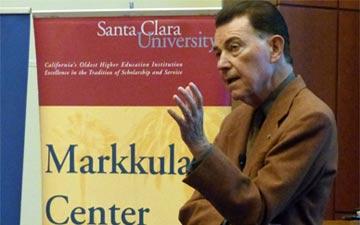
As part of the Markkula Center's yearlong series of talks on conscience, Francisco Ayala* of the University of California, Irvine, member of the National Academy of Sciences, recipient of the Templeton Prize, the National Medal of Science, the Mendel Medal, and many more honors too numerous to list, came to campus to discuss the topic of whether biological evolution is compatible with the existence of a moral conscience. Here is a brief summary of what he said.
The overarching theme of Ayala's talk was that yes, indeed, biological evolution is compatible with the existence of a moral conscience. In fact, evolution is what makes us capable of having a moral conscience in the first place.
Ayala began his talk with the long view: the origin of the universe, the origin of life, the "Cambrian explosion" of animal evolution, the origin of primates, the origin of hominids, and finally, the origin of Homo sapiens. He discussed two anatomical traits that certainly set us apart from other apes: we are bipedal (we have two feet), and we have large brains. Bipedalism evolved first, and large brains second, with the advent of toolmaking. Toolmaking correlated with the human brain growing to three times its previous size over a 2 million year period, creating the intellectual capacity for culture, language, and other products of intelligence, including moral conscience, and moral codes.
Ayala then commented on how different cultural evolution is from biological evolution. Biological evolution relies on the reproductive success of individuals, while cultural evolution relies on the reproductive success of ideas. Cultural evolution can sweep changes across a population as fast as smart phones have swept across the world. We didn't inherit our smart phones from our parents – in fact that would be impossible, since when we were born, smart phones had not yet been invented. Instead, culture and tools evolved even during our lifetimes, providing the new tools we use today.
Ayala used the example of the Ten Commandments to illustrate how culture can spread much more easily than biology. Very likely most of us in the room, he said, are not descended from the ancient Hebrews. And yet the Ten Commandments are part of our cultural inheritance. The cultural idea spread much faster than biology could have spread it. Culture is vastly more efficient at adaption, so much so that now we, through culture, adapt the environment to ourselves, and not ourselves to the environment. Humans are still tropical animals, for example, yet thanks to clothing we can live anywhere on the planet – not due to our genes, but due to our culture, Ayala explained.
Wrapping up, Ayala referred to Charles Darwin's the idea that any intelligent social animal will have morality. Evolution has given us the moral capacity, but the specifics of moral codes may vary, just as we all have the capacity for language, yet we do not all speak the same language. Ayala proposed three elements for the existence of a capacity for ethics, which brought his talk full circle. First, we need to be able to predict the consequences of our actions – this is a capacity we have because of toolmaking. Second, we need to be able to make judgments of good and bad – we can do this because of our ability to categorize, which relates to language. Third, we need the ability to choose between courses of action – which again relates to our ability to envision the future.
One questions raised by the audience was whether non-human animals could have a moral conscience. Ayala was firmly against this idea. Animals, he said, do not have sufficient self-awareness to know that they exist as individuals, and evidence to the contrary is "not real science." Another question concerned whether Ayala was a moral realist (someone who believes that moral norms are real, independent of humanity) or a constructionist (someone who believes that moral norms are just something humans arbitrarily make up). Ayala did not accept either category. Instead, he argued that moral norms are related to our biology and evolution. Evolution makes morality – including the human moral conscience – possible.
*Professor Ayala resigned in July 2018 from his position at the University of California, Irvine, after a university investigation substantiated sexual harassment claims against him.
Brian Green is assistant director of Campus Ethics Programs at the Markkula Center for Applied Ethics.
